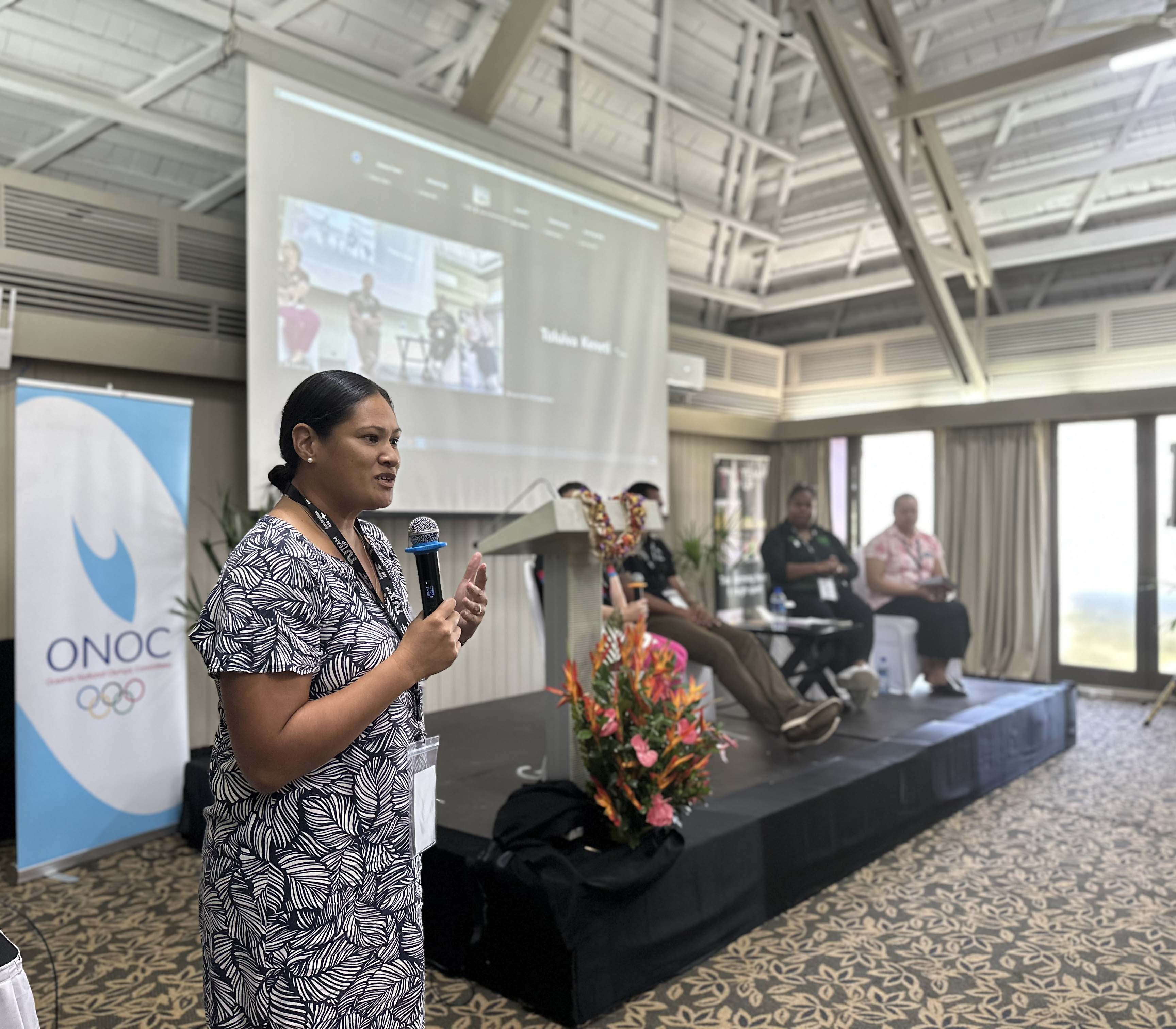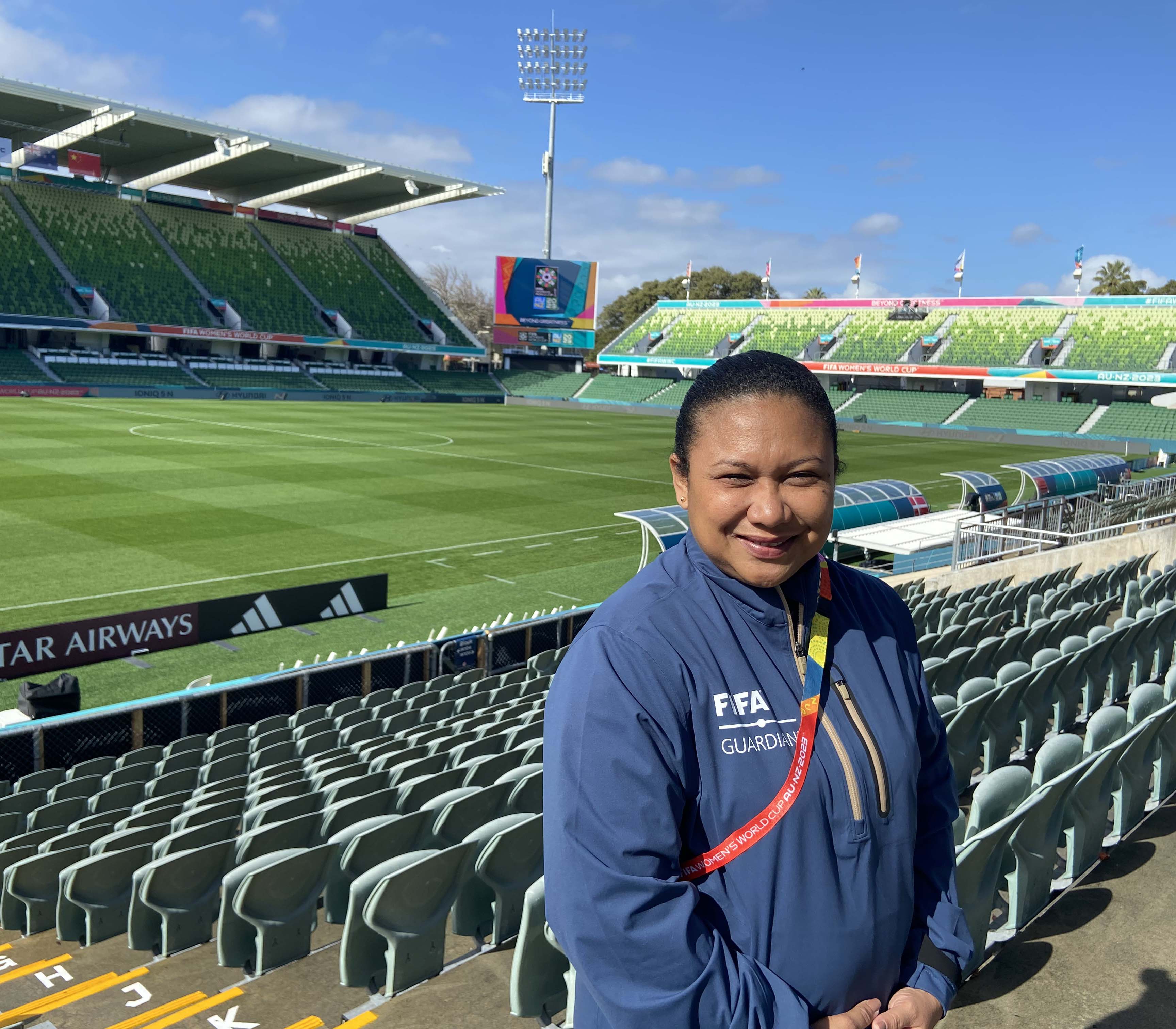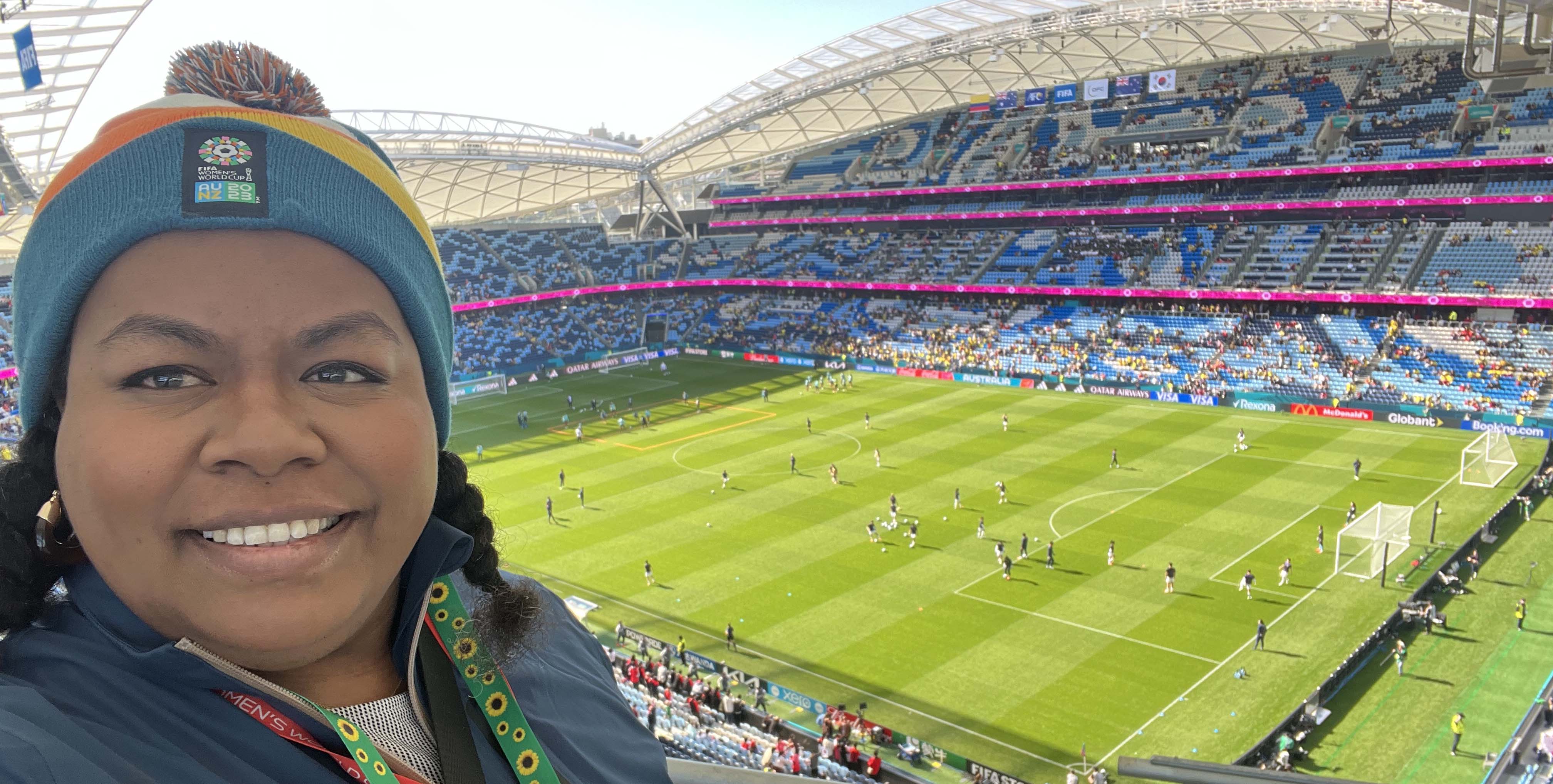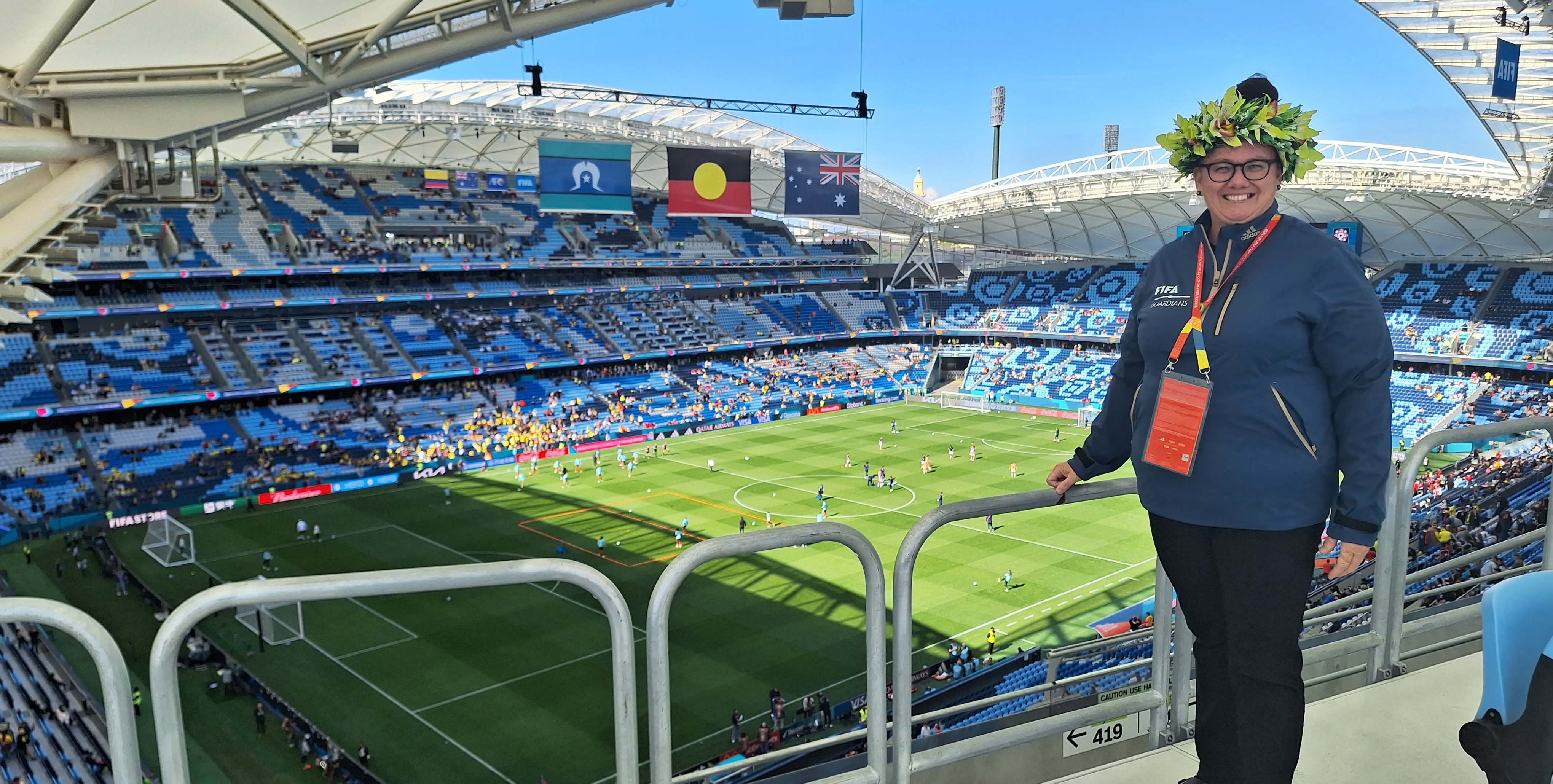The Australian Government is now in a caretaker period in advance of the forthcoming election. Until a new government is sworn in, government operations are conducted in accordance with the caretaker conventions.
TOURNAMENT SAFEGUARDING
At the recently concluded FIFA Women's World Cup Australia and New Zealand 2023, a team of Pacific Island safeguarding specialists and observers offered support across four Australian cities, in an initiative jointly coordinated between FIFA and Team Up.
Nine Pacific safeguarding observers from four countries – Fiji, Papua New Guinea, Samoa and Tonga – as well as staff from FIFA and Team Up’s strategic partners – joined Team Up’s own safeguarding specialists to provide expertise on matchdays and in other tournament settings across Adelaide/Tarntanya, Brisbane/Meaanjin, Perth/Boorloo and Sydney/Gadigal and Wangal.
Many of these observers reconvened at the Team Up-supported Regional Safeguarding Skills Building Workshop in Fiji in October, to reflect on their experiences and on the lessons learnt at the tournament.
The workshop provided the perfect backdrop for an enlightening panel conversation, led by those who participated in safeguarding support at the FIFA Women's World Cup.
Their experiences and insights offered valuable lessons for the Pacific sports community, emphasising the importance of safeguarding measures, particularly for women and girls.


Among the panellists was Asiani Vagi from the Papua New Guinea Olympic Committee (PNGOC), who is involved in the delivery of the Team Up-supported Kicks 4 Kokoda program. Sharing her reflections from the tournament, she emphasised the indispensable importance of safeguarding within sporting organisations.
Asiani highlighted the importance of using her new-found knowledge to enhance safety protocols for athletes, including Para-athletes and minors, back in Papua New Guinea.
"It was very encouraging to hear from teams at the World Cup that safeguarding is an integral part of their athlete wellbeing program. This is what we want to see across the region for our Pacific athletes. We have started this journey, which is good, but we still have a lot of work to do in terms of education and awareness, strengthening of structures and processes, and reporting and monitoring. I am working to apply the new skills and knowledge I learned in Australia,” she said.
Justine Samu, a key figure in the Team Up-supported One Netball program in Samoa, also added her perspective on the FIFA Women’s World Cup experience, underlining the urgency of fostering an inclusive and diverse workforce culture within sporting events. Justine stressed the necessity of not only addressing incidents but also proactively implementing preventive measures to curb negative behaviors that threaten the wellbeing of participants.
"What I've come to see is that, in 2023, a lot of negative behaviors that inflict pain on people have been normalised, and we need to call this out and people need to understand that it's not ok, and that's what we're here for – showing people that they can report incidents, but the most important part is about putting preventative measures in place so that these things don't continue to happen,” Justine reflected.
Ema Levaci from the National Rugby League (NRL) in Fiji, who manages the Team Up-supported League for Life program, spoke passionately about the necessity of ensuring a welcoming and secure environment for all individuals involved in sports.
Drawing from her experience in Sydney during the FIFA Women's World Cup, Ema highlighted the importance of prioritising safeguarding measures to guarantee the safety of vulnerable communities, particularly children and individuals with disabilities.
She said: "For me, safeguarding is a must and priority - ensuring everyone involved in sport, at every level, feels welcome, accepted and safe - especially those within our vulnerable communities, including children and people with a disability."
The profound insights and observations from the Pacific safeguarding observers shed light on the critical need for stronger education, awareness, and comprehensive systems to effectively report and monitor safeguarding issues. Their presence at the World Cup not only reinforced the importance of creating a safe and respectful sporting culture but also underscored the role of every individual in promoting a secure environment.
Their reflections resonated with a shared vision of instilling a culture of respect and safety across the Pacific sports community, and with the collective commitment towards prioritising athlete wellbeing and safety across the region.
The nine Pacific safeguarding observers who provided support at the FIFA Women’s World Cup 2023 were:
- Asiani Vagi from the PNG Olympic Committee, who works on the Team Up-supported Kicks 4 Kokoda program in PNG
- Ema Levaci from NRL Fiji, who works on the Team Up-supported League for Life program in Fiji
- Justine Samu from Netball Samoa, who works on the Team Up-supported One Netball program in Samoa
- Kiko Penitani from NRL Tonga, who works on the Team Up-supported League for Life program in Tonga
- Michelle Paiti who works for Oceania Football Confederation on the Team Up-supported Just Play programs in Fiji, PNG, Samoa, Tonga and Vanuatu
- Palu Uhatahi-Tu’amoheloa from Tonga Football Association, who works on the Team Up-supported Just Play program in Tonga
- Tessa-Maree Heritage who works for Oceania National Olympic Committees (ONOC) in Fiji
- Tihrani Uluinakauvadra from Oceania Rugby, who works on the Team Up-supported Get Into Rugby PLUS programs in Fiji and Samoa and the Rugby Union Inclusion Impact programs in Nauru and PNG
- Toluiva Keneti from Lakapi Samoa, who works on the Team Up-supported Get into Rugby PLUS program in Samoa
Watch the videos below to hear more from the safeguarding observers:










